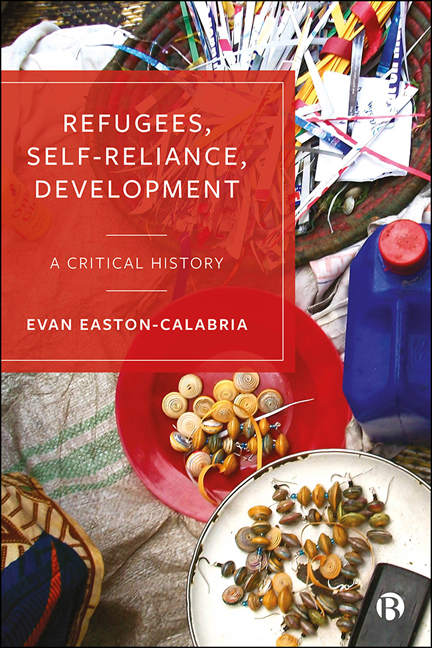Book contents
- Frontmatter
- Dedication
- Contents
- List of Figures and Tables
- Abbreviations and Acronyms
- Notes on the Author
- Acknowledgements
- 1 Introduction: Why Refugee Self-Reliance?
- 2 Self-Sufficiency out of Necessity: Refugee Self-Reliance Assistance in Interwar Greece
- 3 Socialism and Self-Reliance: Refugee Self-Reliance Assistance in Post-Colonial East Africa
- 4 Warriors of Self-Reliance: Refugee Self-Reliance Assistance in Cold War Pakistan
- 5 Dignity in Informality? Urban Refugee Self-Reliance Assistance in Kampala, Uganda
- 6 Livelihoods 2.0? Refugee Self-Reliance and the Digital Gig Economy
- 7 Conclusion
- Annex: A Note on Methods and Sources
- References
- Index
1 - Introduction: Why Refugee Self-Reliance?
Published online by Cambridge University Press: 12 October 2022
- Frontmatter
- Dedication
- Contents
- List of Figures and Tables
- Abbreviations and Acronyms
- Notes on the Author
- Acknowledgements
- 1 Introduction: Why Refugee Self-Reliance?
- 2 Self-Sufficiency out of Necessity: Refugee Self-Reliance Assistance in Interwar Greece
- 3 Socialism and Self-Reliance: Refugee Self-Reliance Assistance in Post-Colonial East Africa
- 4 Warriors of Self-Reliance: Refugee Self-Reliance Assistance in Cold War Pakistan
- 5 Dignity in Informality? Urban Refugee Self-Reliance Assistance in Kampala, Uganda
- 6 Livelihoods 2.0? Refugee Self-Reliance and the Digital Gig Economy
- 7 Conclusion
- Annex: A Note on Methods and Sources
- References
- Index
Summary
Their labour is often all that refugees have to sell.
I often start discussions on refugee self-reliance with an example of success. Have you heard, I ask, about the successful settlement of 15,000 refugees, mostly farmers, in 15 villages? They were given tools, seeds, and livestock for their first year; schools and hospitals were built in the area which locals could also use. Different cottage industries were started for those uninterested in farming. They were provided emergency rations until the harvest. After their first year, most of the refugees were entirely self-reliant.
Where, you might ask, did this take place? It hadn't come across your inbox recently, although it does sound similar to a lot of development programming for refugees today.
Oh, I explain, this was done in the 1920s in Greece. And it was not the United Nations that undertook this work, it was the League of Nations.
Indeed, despite the near century-long gap in between programming, there are striking likenesses in work conducted by the League of Nations and other organizations to foster refugee self-reliance (what I term here refugee self-reliance assistance) and that being undertaken today. A 2018 evaluation of the United Nations High Commissioner for Refugees’ (UNHCR) livelihoods strategies and approaches from 2014– 2018 found, for example, that the most common interventions were vocational training, agricultural interventions, and artisan livelihoods opportunities – shockingly similar to the farming and cottage industries of embroidery work and carpet weaving documented in League of Nations reports on refugee assistance from the 1920s and 1930s. Yet the long history of refugee self-reliance assistance is often obscured by an emphasis on current challenges or by the promises of new solutions to protracted displacement.
That said, a heightened focus on refugee self-reliance is clearly present. Since the beginning of the 21st century, UNHCR and other humanitarian and development actors have increasingly promoted self-reliance as a desirable goal for both individual refugees and their communities. In 2018, UNHCR had livelihoods programming for 75 countries with a budget of over $70 million USD. As a Women's Refugee Commission report reads, ‘Everyone, from local community-based organizations to international nongovernmental organizations to policy makers and donors, wants to support, fund and implement more effective programs to support the self-reliance of the displaced’.
- Type
- Chapter
- Information
- Refugees, Self-reliance, DevelopmentA Critical History, pp. 1 - 24Publisher: Bristol University PressPrint publication year: 2022



